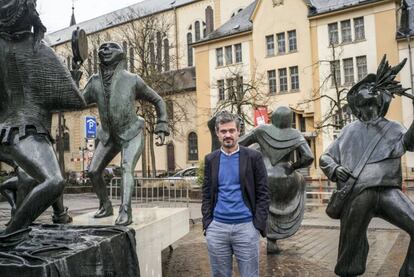Are there tax havens in the heart of the European Union?
The EU list of offenders only includes jurisdictions outside Europe, yet there is evidence that foreign investment is flowing through small countries such as Ireland and Luxembourg without any link to actual activity


Luxembourg is the kind of place where a Swedish executive will talk financial secrecy over a hamburger while taxi drivers dwell nostalgically on their native Portugal, a country that accounts for a third of its foreign community. It is a land where salaries are high and the cost of living higher; where one Spanish journalist-turned-waitress espouses the benefits of having the highest minimum wage in the EU, at more than €2,100 gross a month, yet explains that you will need to share an apartment to enjoy it given the prohibitive price of rent.
There are, of course, native Luxembourgers around, but you do not often run into them, despite the fact that the Grand Duchy only has an area of 2,586 square kilometers. Of its 600,000 inhabitants, 48% have immigrated here, and 69% of them live in the capital.
There is plenty of evidence that foreign investment is flowing through small countries such as Ireland and Luxembourg without any link to actual activity
MEP Paul Tang
Yet the second-smallest EU state after Malta in terms of both size and population is a magnet for money. Working cheek by jowl, 137 banks from 28 countries do business here, and its investment funds manage assets worth €4.2 trillion – almost four times Spain’s GDP.
The financial sector accounts for a third of its wealth, a far greater share than the construction industry accounted for in Spain during the property boom. And giants such as Amazon – the world’s biggest company by market capitalization – have their European headquarters here. But why does all this money flow through this micro-state, a mere speck on the map between Belgium, Germany and France?
“In reality, it’s very simple: if you are a member of the European single market,” says Nicolas Mackel, executive director of Luxembourg for Finance, the finance sector’s lobby. “It matters very little if you are big or small. Thinking in terms of the nation state is 19th-century logic. The EU has a market of 500 million consumers. Spain exports wine and olives. We have made the financial industry our main service.”

Luxembourg’s government has used the lobby to improve a reputation that was badly scarred by the “Luxleaks” scandal, when an investigation launched in 2014 by the International Consortium of Investigative Journalists exposed tailor-made tax solutions that allowed some 350 multinationals to save billions of euros. The revelation sent alarm bells ringing through post-crisis Europe, and outside pressure pushed Xavier Bettel’s government to put an end to decades of banking secrecy. Or so it seemed. “The government felt obliged to act,” says Diego Velázquez, a journalist with Le Luxemburger Wort. “And it presented itself as a country that collaborates and wants to enact reforms, but make no mistake, it is talk.”
David Wagner, a member of parliament for the democratic socialist party The Left, says there has been some tinkering with the tax system, but guesses that its porous nature is what keeps the economy buoyant. “Luxembourg law allows for a huge number of exemptions, which the big consultancy firms exploit to reduce tax bills to absurd amounts,” says Wagner, whose party is the only one in Luxembourg to speak in plain terms. “The bigger the company, the lower rate it pays. Yes, it is a tax haven for multinationals.”
Brussels is not satisfied with Luxembourg’s reforms, either. Last year, the European Commissioner for Economic and Financial Affairs, Pierre Moscovici, pointed to an in-depth study showing that Belgium, Cyprus, Hungary, Ireland, Malta, the Netherlands and Luxembourg have aggressive tax practices with the potential to undermine the balance of the internal market and add to the average taxpayer’s burden.
The selection process should be rigorously applied to every country equally, including those in the EU
Ernest Urtasun, The Greens
Meanwhile, a spokesman for the Finance Ministry in Luxembourg denies that the country is a tax haven, and the international lists of tax havens back him on this – neither the Organization for Economic Cooperation and Development (OECD) or the EU classify it as such.
However, there are many who are dubious about the validity of the EU’s criteria. The European Parliament’s temporary commission on money laundering and tax fraud and avoidance wanted a list compiled, hoping the exposure would prompt those who appeared on it to mend their ways. But it seems that could have been wishful thinking. When the names were produced in 2017, only American Samoa, Guam, Samoa, Trinidad and Tobago, and the Virgin Islands were blacklisted.
Numerous Members of the European Parliament (MEPs) have expressed disgruntlement at the lack of clear criteria. “[The list] should include European countries; there is plenty of evidence that foreign investment is flowing through small countries such as Ireland and Luxembourg without any link to actual activity,” says the Dutch MEP Paul Tang, a Social Democrat.
Ernest Urtasun, an MEP for The Greens, agrees: “The selection process should be rigorously applied to every country equally, including those in the EU.”
Image whitewash
Faced with the lack of rigorous accountability, the non-profit group Intermon Oxfam has drawn up its own list. And there were no surprises: the countries that had applied huge political pressure to avoid appearing on the EU list – namely the Netherlands, Luxembourg, Ireland and Cyprus – all featured prominently.

On Franklin D. Roosevelt Avenue, on the outskirts of the Luxembourg capital, a massive new glass building has been added to the existing forest of glass. This is Amazon’s European headquarters. The company was obliged by the European Commission in 2017 to give Luxembourg back €282 million in unpaid taxes derived from exploiting illegal tax breaks. The government appealed the decision and the money is currently parked in an account awaiting a decision from the European Court of Justice.
The headquarters were established here recently, and although the corridors are silent and largely empty, some 2,000 workers are toiling out of sight. None of them are shifting packages, however. This is home to Amazon’s tech team, human resources, lawyers and executives. The question is, why not Paris or Berlin, where the markets are bigger? “There are several reasons,” says a company source. “It’s a multilingual environment filled with experts. And, of course, the tax structure is attractive and Amazon takes that into account like any other company would.”
It is not just Amazon that Brussels has brought to book. The EU Commission has also ordered the recovery of billions of euros from Fiat and Engie in Luxembourg; Starbucks in the Netherlands; 35 multinationals in Belgium and a handful of firms in Gibraltar. But the multinational that was stung the hardest was Apple, which has been ordered to return as much as €14.2 billion to Ireland with interest included. Each country involved was attracting investment by offering tax breaks to multinationals.
Tax alignment
There is a heated debate between legality and ethics. Countries under the microscope often argue they have a legal right to compete fiscally and they are reluctant to listen to proposals involving an across-the-board tax scheme. “Each country should be free to fix taxes according to its national priorities,” says a spokesman for the Luxembourg Finance Ministry.
“Competition is healthy. And it is legitimate. To align the rules would certainly increase taxation. And that is not necessarily the most appropriate thing,” says Mackel, from Luxembourg’s financial lobby.
In fact, few believe that Europe’s member states will ever reach a consensus on tax. “Europe is the sum of national egos,” says Jean Arthuis, a French MEP with Emmanuel Macron’s En Marche movement. “We compete against each other. When [Jean-Claude] Juncker was going to run for the Commission, he came to my office and I asked him, ‘Jean-Claude, what is your fiscal vision for Europe? Because, between us, you are the president of the Eurogroup [as well as being the Finance Minister of Luxembourg at that time] and so in the morning you remind us of the need to balance our public accounts, but in the afternoon you empty our coffers with your tax policies.”
English version by Heather Galloway.